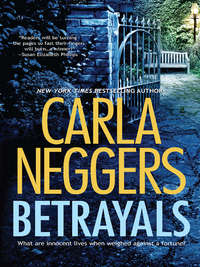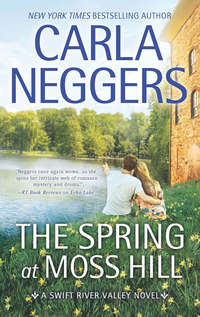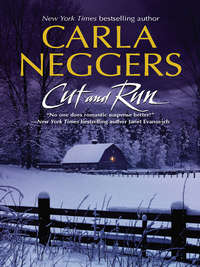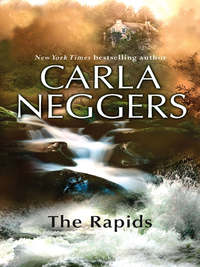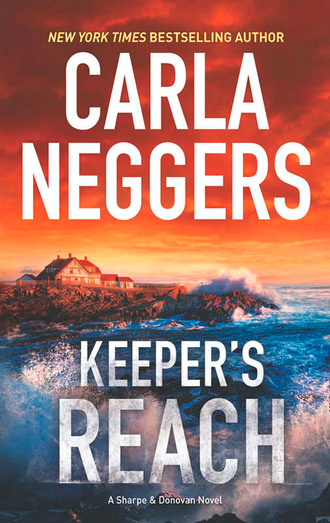
Полная версия
Keeper's Reach
“A diplomat?”
“I guess you could say that.”
“I don’t understand why they would come to Maine in February. The Plum Tree must have given them a good deal or something.”
“If I knew what was going on, I’d tell you.”
She didn’t respond at once. He wasn’t sure how well she could hear him, but he figured she wasn’t going to gripe about the lousy connection. It was better than nothing. She had been after him for months to get a cell phone rather than to rely on the landline at the general store.
“I hope these people aren’t a problem for you,” she said.
“They’re not. I’m glad you called. What are you and Pop up to this weekend?”
“Emma is heading up here tomorrow afternoon. She’s staying at the convent for two nights, and I’m taking her to lunch on Saturday. She’ll be on her own. I’m looking forward to spending some time with her. I’ve never had a daughter, and Emma will be my first daughter-in-law.”
Mike smiled, despite his tension. His mother’s tone said “it’s about time” even if she would never utter those words out loud. He doubted she’d ever imagined one of her sons marrying a woman like Emma Sharpe. An FBI agent, maybe. But an FBI agent who was also a member of a family of renowned art detectives? An ex-nun? Mike, the eldest, had put aside his own doubts about Emma in the months since Colin, the second-born Donovan, had met her, fallen for her and asked her to marry him.
“Mike...” His mother hesitated. “This Reed Cooper...”
“It’ll be fine. Don’t worry. Have a good time with Emma.”
When she disconnected, Mike could tell she wasn’t satisfied. She might not be able to put her finger on exactly why, but she had well-honed instincts after all this time. Her four sons had been in plenty of jams—and she was well aware she didn’t know about all of them and there were likely more to come. Mike was ex-army living out on the Bold Coast as a wilderness guide and outfitter. Colin was an FBI agent based in Boston. Andy was a lobsterman. Kevin was a Maine state marine patrol officer.
Frank Donovan, their father, would just tell his wife, “The boys know what they’re doing.”
Sometimes it was true. Not always.
Mike stepped outside onto the porch. He had his grandfather’s old wooden canoe turned over on a rack. It needed work. Winter was a good time to fix things that the busy warm-weather months didn’t allow time for. He had the occasional backcountry skier or snowshoe group request his skills as a wilderness guide and outfitter, but not many people were interested in a trek along the icebound cliffs of the Bold Coast in the dead of winter.
Even in summer, he seldom had company. On a cold February night, he might see a white-tailed deer or a moose, but otherwise he had his spot in paradise to himself. His clients never came to his place, winter or summer. He would meet them at the general store in the village a few miles down the road. Some of them would ask, “Hey, Mike, where do you live?” He would say, “On the coast,” as if it could be anywhere on Maine’s more than three thousand miles of coastline.
The sun first hit the Continental United States on the Bold Coast, and he liked to be up for it, no matter what time. It was noticeably earlier now that it was late February. That morning the ocean had glowed with shades of deep orange, red and purple. Now it reflected the night sky of sparkling stars and a quarter moon.
He breathed in the salt-tinged air and listened to the tide wash over ice, rocks and sand. He liked to tell himself this place wasn’t an escape, as it had been for his grandfather. He lived here.
His mother wanted him to get a dog. Dogs are good company, she would tell him.
His father had been more direct: There must be women up there.
If his parents guessed there had been a woman during their firstborn’s time in the army, they didn’t say.
Mike had no photos of Naomi MacBride.
He didn’t need any. Every inch of her was etched in his mind forever. He could see her wide smile and dark, wild, curly hair. He could hear her laughter—she had an indomitable sense of humor—and he could feel her skin, hot and smooth, under his hands.
He turned away from the water and walked back to his cabin.
* * *
An ancient Vermont Castings woodstove served as the cabin’s sole source of heat. It had to be tended, but Mike had people who could do that for him when he was away. He might like his solitude but that didn’t mean he was without friends.
He checked his phone. No texts or emails.
He put another log on the fire and went back to cooking his dinner. He sautéed garlic, ginger, green beans, ground beef, soy sauce and rice vinegar and made brown rice. The kind of meal he could eat for a couple of days.
He dumped his dinner on a plate and sat by the fire.
Should he tell his FBI brother about another FBI agent coming to Maine this weekend for a get-together with private security contractors?
Probably, but Mike didn’t see any big rush. He’d call Colin in the morning.
He felt the heat of the fire and tried to remember the last time he had allowed himself to think about Naomi. Months, anyway. A year? Longer?
Not longer.
He didn’t know what he would do about Reed Cooper and the gathering at the Plum Tree. He did know that nothing good ever happened when Naomi MacBride was anywhere near his life.
It was something he couldn’t let himself forget.
4
Near Stow-on-the-Wold, the Cotswolds, England Thursday, 8:00 a.m., BST
The insistent crow of a rooster and the smell of rain roused Naomi MacBride from a not-so-dead sleep. She rolled onto her back and opened her eyes, trying to shake off dreams of a life and a man she had left behind years ago. She was in England, in a quiet Cotswolds village two hours west of London. It was February, and from the crowing rooster, she would guess it was morning, although it was still quite dark. She was in a double four-poster bed in a cute room in a small building located across the courtyard of a classic English pub complete with low, beamed ceilings and a huge open fireplace. She’d had a pint there last night before venturing into her room and falling into bed. It had been a long week.
Her room also had a low ceiling. She could feel its looming presence. She had never been one for squirrely places. Hence, the cracked window and her natural wake-up call.
The rooster crowed again.
He didn’t sound as if he planned to give up anytime soon.
With a groan, Naomi sat up, keeping the duvet tucked around her. She could hear more chickens now, warbling outside her window. Probably hens. If she were one of them, she would organize a revolt against the rooster.
Chickens.
She sighed. “Of course the place has chickens.”
She threw off the duvet and stood on a soft hooked rug that, she recalled, depicted a sheep. It was too dark to see it now. She shivered, rubbing her bare arms, wishing she had resisted the impulse to take this side trip and instead had spent her last night in England in London, where she’d had a room in a proper hotel with five-star service, a bustling lobby, a great location and no chickens. But here she was in the English countryside after a week of intense meetings.
She fumbled with the lamp on the nightstand, found the switch and turned it on. The worst part of her constant travel, Naomi decided, was locating light switches.
Nightmares about an ex-lover weren’t that great, either.
It wasn’t her fault she had dreamed about Mike Donovan. As much as she wanted to find someone to blame and could pick a name or two, she knew it wasn’t anyone’s fault. Not really.
She seldom had nightmares anymore about the dangers she’d faced in the past decade, maybe because she’d found healthy ways to process them. Post-trauma therapy had helped—or debriefing, or whatever one wanted to call it. Naomi, you’ve been through hell, her mother, blunt as ever, had told her. You need to talk to someone.
Naomi hadn’t mentioned Mike in her sessions—or to her mother. What was the point? By then, he was just another Special Forces soldier she would never see again.
She felt the cool air from the cracked window. Her room really was adorable with its English-country-chic decor. When she’d arrived last night, the woman at the reception desk in the pub had handed her a real key and reminded her that this was a pub that let rooms—meaning she could expect noise from the patrons late into the evening.
No mention of early-morning roosters.
Not that early, Naomi thought as she noted the time on her phone, faceup on the nightstand. Eight twenty. She had been in England long enough to adjust to the time change but not so long that it didn’t still feel like the middle of the night. It was, after all, only 2:00 a.m. at home in Nashville.
She went to the window and pulled back the curtains, letting in more of the gray light. Her rooster was parading on the edge of a stone fountain in the middle of the courtyard. He was black with white spots, or at least appeared to be. Sunlight would help. He threw back his head and belted out another crow, letting the world know he was awake and ready to take on the day.
“Well, good for you,” Naomi muttered, remembering her granny describing how she would have to catch a chicken and wring its neck for Sunday dinner. That prospect didn’t seem as horrifying at the moment as it had at six years old.
She noticed a handful of brown-feathered hens pecking and warbling in the herb gardens that flanked the pretty courtyard. She doubted they or the rooster were in any danger of becoming dinner. She envisioned the courtyard in spring and summer, when the dripping, winter-browned vines that trailed the trellises and the tall fence would be blossoming with clematis, roses and wisteria. The smattering of tables were all empty now, the cold, gray, drizzly morning not exactly a draw for breakfast outdoors.
With a yawn, Naomi ducked into the bathroom, stifling a yelp when her bare feet hit the cold tile floor. She spread a bath mat in front of the tub and turned on the water, letting it get good and hot while she pulled off her yoga pants and tank top, her standard sleepwear on the road—which meant her standard sleepwear, period. She opened the bottles of luxurious, locally made shampoo, conditioner and body wash. She wondered what it would be like to stay in this place for a few days for a break. A real getaway. It was appealing even now, in midwinter, with its soothing blend of English charm and sophistication and its perfect location in the heart of a small, traditional Cotswolds village.
A getaway would have to wait. She had a late-afternoon flight back to Nashville via Atlanta. She would gain six hours and be home in time to sleep in her own bed tonight.
“Preferably without nightmares.”
And definitely without chickens, she thought, smiling as she stepped into the tub and eased under the steamy shower.
When she stepped out of the tub again and wrapped up in a fluffy towel, she was much warmer and smelled faintly of herbs and citrus. She dried off, combed out her hair, basic brown and ridiculously curly, and got dressed. Since she had expected to stay in London for the duration of her trip, she hadn’t packed any serious country clothes. The slim, stretchy pants and wine-colored cashmere sweater she planned to wear on her flight would have to do for her morning in the Cotswolds. She did have an authentic Barbour jacket, an indulgence she had succumbed to on a long, drizzly walk in London. She never remembered to bring an umbrella with her, and that day she had bolted out of her hotel without so much as a jacket. Too much on her mind. She was good at assembling information and making sense of it, analyzing it and seeing where it pointed, but it was often a messy process that completely absorbed her.
It certainly had been that afternoon in London. She had found herself cold and wet, standing in front of a store that sold Barbour jackets. Her jacket’s waxed dark green cotton and English-country look would do nicely today. Her slip-on ankle boots, at least, were good for walking, if not for a full-blown trek on one of the network of walking trails that zigzagged throughout the region. Before dozing off last night, she had flipped through a bedside notebook filled with “guest information” and had noticed mention of a medieval church in Stow-on-the-Wold whose arched door had reportedly inspired J.R.R. Tolkien when he created the door to Moria.
Wouldn’t it be wonderful to prowl through an English churchyard and then relax in an English tea shop?
It wouldn’t happen on this trip.
Naomi ignored a tug of regret mixed with nostalgia and loneliness, as if she had lost something that, of course, she’d never had. Love, trust, understanding.
Someone to wander through churchyards and have tea with her.
It was the nightmare, she knew. It still had her in its grip.
What are your plans for after the army, Mike?
She could see his enigmatic smile, at the same time self-deprecating and confident—and annoyingly fatalistic. Without saying anything, he had managed to tell her that he didn’t think past the army. If he got home to Maine, he got home to Maine. He wasn’t a pessimist, he would say. He was a realist who lived in the moment.
Did Mike Donovan ever imagine himself wandering through old English churchyards and having tea and scones with the woman he loved?
“Not a chance,” Naomi said, grabbing her jacket as she headed out to the courtyard and the chickens.
* * *
The same man who had poured her pint last night showed Naomi into the breakfast room in the pub building across the courtyard. He offered her tea or coffee. “Coffee, please,” she said, not quite choking on her words when she recognized the only other diner, a man seated on a cushioned bench, watching her, his back to the wall. It was all she could do not to turn around and walk out of there. She forced herself to smile at the waiter. “Thanks.”
He retreated, and she pushed back her dismay, frustration and mad curiosity as she walked over to the table where Ted Kavanagh sat with a pot of tea. “I didn’t take you for a tea drinker, T.K.,” she said.
“I’ve been here for an hour. I’ve already had coffee and a full English breakfast.” He motioned to the chair across from him. “Have a seat, Naomi.”
She didn’t want to but if she sat at another table, he’d still be here, a few feet away, annoyed and annoying. She sat, not much distance across the little blond-wood table. “First we run into each other in St. James’s Park in London. Now here we are in the Cotswolds.” She unfurled a cloth napkin. “Honestly, T.K., I don’t need a crazy FBI agent bird-dogging me.”
“Sure you’re not following me?”
“Yes. Positive. I need to get better at spotting a tail.”
“A good skill to have. What’s with the T.K.?”
“We’re in a foreign country. I figure it’s okay to be informal. Don’t your friends call you T.K.?”
“No.”
Probably true. Kavanagh wasn’t wearing a suit this morning, but he had a buttoned-down, perpetually suspicious look about him that she had come to know working with him in Afghanistan. She hadn’t expected to see him again after she left the State Department as an intelligence analyst, and then—poof—there he was in London.
Except there was no poof about it. Ted Kavanagh was a deliberate, calculating, experienced federal agent.
That didn’t mean he wasn’t crazy.
Naomi pulled off her jacket and hung it on the back of her chair. Kavanagh was a decade older than she was, and he had been married when she knew him in Kabul. Since he wasn’t wearing a wedding ring, she guessed he wasn’t married any longer. She supposed he could have developed an allergy to metals. She didn’t plan to ask.
“In a perfect world, T.K.,” she said, “it would be spring, and I’d be having breakfast outside with the chickens and the scent of wisteria.”
“Wisteria’s a flower, right?”
“It’s a climbing flowering shrub. It’s all over the Cotswolds but it’s not in bloom this time of year. The flowers are typically purple.”
“I guess that’s good. People like purple.”
“You don’t care about wisteria. Did you stay here last night?”
He pointed at the ceiling. “Room above the pub. I rented a car and drove in from London.”
“Not me. I hired a car. Driving in London is a nightmare. A shame I didn’t know you were following me here. I could have bummed a ride off you and saved myself the money.”
“Traffic was terrible. I’ll never get used to driving on the left.” He didn’t sound as if he expected her to believe him. “You’re staying in the building across the courtyard. What is it, an old pigsty?”
“I don’t know. It’s charming. I wish I could stay longer.” She gave a slightly fake yawn. “I’m not a good conversationalist before coffee. What are my choices for breakfast?”
“Cold buffet and a choice of hot breakfast. English, grilled kippers, porridge.”
“As many times as I’ve been to England, I still don’t know what a kipper is.”
“Fish.”
“I know that much. Have you ever tried kippers?”
“Yes. They’re good grilled. Not the most attractive food.”
He was clearly not there to talk about kippers, either. The waiter returned with her coffee press. Naomi settled on porridge for her hot breakfast, and he again withdrew, giving no indication he sensed she wasn’t that happy with her breakfast mate.
She poured coffee into the mug already on the table and added cream from a small pitcher. Kavanagh eyed her without comment. He didn’t look tired or distracted or as if he’d had nightmares. He looked alert and impatient, a know-it-all who figured he could tell what she was thinking before she thought it. A good FBI agent, maybe, but not her favorite. She had tolerated him in Afghanistan because she’d had no choice.
Without comment, she got up and helped herself to the buffet. She filled a bowl with natural yogurt and added a couple of scoops of chopped fresh fruit, then put a croissant, still warm from the oven, on a small plate.
“I’m disappointed,” she said as she returned to her seat. “I wanted scones.”
Kavanagh frowned at her. “A croissant and porridge? That’s a lot of carbs, Naomi.”
“I’m flying later today.” She figured he already knew that. “Carbs will help me sleep. I have to tell you, T.K., it creeps me out that you’re here.”
He poured the last few drops of his tea. It was the color of coffee by now. “You should feel well protected.”
Naomi dipped a spoon into her yogurt and fruit. “Why is it that I don’t?”
“Because you have a habit of placing your trust in the wrong people.”
“If that were true, I’d be dead by now.” She leveled her gaze at him. “So would you.”
“Maybe so.”
There was no maybe about it, but Naomi didn’t argue with him. Kavanagh wanted her to have a habit of trusting the wrong people because it would help him somehow, if only to throw her off balance and get in her head.
He glanced at a row of framed botanical prints on the side wall. Local grasses, wildflowers and herbs. “What are you up to, Naomi?” he asked, shifting back to her.
She tried the yogurt. It was smooth and creamy, made without added pectin. With the fruit, it was perfection. “Are you following me because you think I’m up to something? As I told you in London, you’re wasting your time. I’m a crisis management consultant who met with a group of medical volunteers who are planning their deployment to a hot spot in Africa. I’m helping them assess their security needs and then take appropriate steps to meet them. That’s all I’m up to.”
Kavanagh smirked at her. “It’s not all.”
“I’m not arguing with you, T.K.”
“Why this particular twee English village?”
Naomi ate more of her yogurt and drank some of her coffee. What she wanted to do was to eat six croissants and go back to bed. She made herself smile at the FBI agent across from her. “Twee. I love that word. I’ve wanted to visit the Cotswolds but never could find the time. Now I have, if only for one night.”
“That doesn’t explain why you chose this village,” Kavanagh said.
“This place comes highly recommended by an internet travel site I trust.” It was true, as far as it went. “What about you? Did you follow my car, or did you overhear me when I told the bellman where I was going? It wasn’t a secret, but the only person I actually told is my mother.”
“How is your mother, Naomi?”
“Great. Sewing up a storm. Think where I could be now if I’d paid attention and let her teach me how to sew drapes and beauty-pageant dresses.”
“Or if your father hadn’t been killed by an IED when you were a freshman at Vanderbilt,” Kavanagh said quietly.
Naomi finished the last of her yogurt. “Yes, that, too.” She refused to let him distract her, even if she had given him the opening. “This is a good place, don’t you think? I’d love to relax here for a few nights.”
Kavanagh leaned forward, his pale green eyes narrowed on her. “You’re giving me careful answers, Naomi.”
“Why wouldn’t I, seeing how you’re an FBI agent?”
Her porridge arrived. The waiter didn’t linger. Naomi didn’t blame him. Kavanagh wasn’t in full-blown FBI interrogation mode, but it was close enough.
She decided to lighten her tone and change the subject. “Did the rooster wake you up this morning? He did me.”
“I didn’t notice a rooster. I sleep soundly.”
She broke off a piece of croissant and popped it in her mouth as she noticed a drizzle of the promised blackberry compote in her porridge. Breakfast was delightful, she decided, refusing to let her companion spoil the moment. “Do you know what kind of rooster has white-spotted black feathers?”
“I’m not here to talk about roosters. Neither are you.”
She picked up the fresh spoon that came with her porridge. It was a lot of porridge. “I’ll look it up. I’m dying to know.”
“You’re playing with fire, Naomi. You know that, don’t you?”
“By having yogurt and porridge with you, you mean?”
Kavanagh’s eyes flared with anger, but he quickly got himself under control. All that FBI discipline and training, she supposed.
Assuming he still was an FBI agent.
She thought about asking to see his credentials to check if they were current, but she wouldn’t be able to identify a good forgery—and Ted Kavanagh would only have a good forgery.
“You know how to get on people’s nerves when it suits you,” he said.
“Sometimes it just works out that way.”
“It’s not on purpose, you mean?”
She didn’t respond. She started on her porridge. It was the chewy pinhead kind, and the trickle of warm blackberry compote turned out to be a sweet, delicious pool. In another life, she would do things like make compotes. In this life—her life now, at this moment—she did things like get through surprise breakfasts with FBI agents she didn’t trust and who didn’t trust her.
“I appreciate that it’s your business to find out things,” he said. “It’s how you make your living. It’s also who you are, though, isn’t it? It’s a control issue. This need to know things.”
“Psychoanalyzing me? It won’t get you far.” She held up her spoon. “This porridge is incredible, T.K. I never would have thought to add blackberry compote, but it’s a stroke of genius. I’m happy I chose the porridge instead of a full English breakfast, since I don’t like black pudding and have trouble with the idea of baked beans before noon. There’s not much you can do to a blackberry that I wouldn’t like. Without the compote, I can’t imagine how annoyed I’d be with you right now. You can’t just make up stuff about me.”
“I’m not making up anything, and I don’t care if you’re annoyed.”
“I’m getting that picture.”
He fingered a bit of loose-leaf tea that had fallen on the table next to his mug. “I need you to be straight with me, Naomi.”









